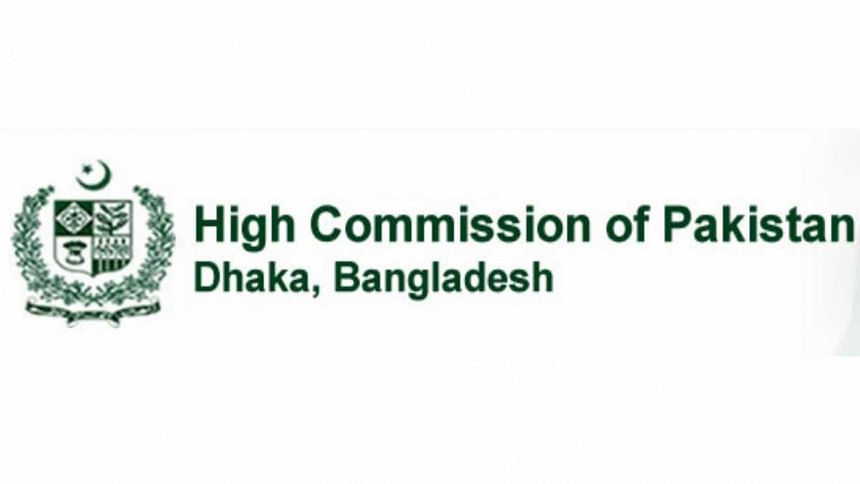Dhaka protests Islamabad's remarks

Terming it a brazen interference in Bangladesh's domestic affairs, Dhaka yesterday protested Islamabad's statement on Saturday's execution of war criminal Mir Quasem Ali.
In a Note Verbale handed over to the acting high commissioner of Pakistan to Bangladesh, Dhaka deplored the September 3 statement of Pakistan foreign ministry that “Pakistan is deeply saddened” over the execution of the prominent leader of Jamaat-e-Islami.
Turkey yesterday expressed sorrow over the matter.
“We have learned with sorrow that the death sentence issued by the International Crimes Tribunal in Bangladesh against Mir Quasem Ali, Key-Financier and Central Executive Council Member of the Jamaat-e-Islami, has been executed in Bangladesh,” according to a press statement of Turkey's foreign ministry.
“We stress once again that the wounds of the past cannot be healed with these methods and hope that this wrong practice will not lead to separation among the brotherly people of Bangladesh,” the statement added.
By openly siding with the Bangladesh nationals convicted of crimes against humanity and genocide, Pakistan once again acknowledged its direct involvement and complicity in the mass atrocities committed during Bangladesh's Liberation War in 1971, said a foreign ministry press release.
"Pakistan statement is completely a direct interfere in Bangladesh's internal affairs,” said Additional Foreign Secretary Kamrul Ahsan, who summoned Samina Mehtab, the acting Pakistani high commissioner.
After the 20-minute meeting from 3:15pm, Kamrul told reporters that the Pakistani envoy was informed that Pakistan has no scope to make any comments on the trial of war criminals in Bangladesh as it was “open, transparent and there was scope for appeal. And Mir Quasem availed the opportunity of appeal before the highest court”.
The Pakistan foreign ministry in a statement after the execution on Saturday night, said Mir Quasem Ali was executed “for the alleged crimes committed before December, 1971, through a flawed judicial process”.
“Ever since the beginning of the trials, several international organisations, human rights groups, and international legal figures have raised objections to the court proceedings, especially regarding fairness and transparency, as well as harassment of lawyers and witnesses representing the accused,” it said.
Pakistan further said Bangladesh should uphold its commitment, as per the Tripartite Agreement of 1974, wherein it "decided not to proceed with the trials as an act of clemency. Recriminations for political gains are counter productive. Pakistan believes that matters should be addressed with a forward looking approach in the noble spirit of reconciliation”.
Pakistan had earlier issued similar statements and adopted resolution in national parliament and provincial assembly after the execution of war criminals to which Bangladesh had reacted by summoning its high commissioner to the foreign office.
The government of Bangladesh strongly rejects Pakistan's claim that these are “recriminations for political gains”. In fact, Mir Quasem was tried for specific crimes he committed during the War of Liberation of Bangladesh, the note said.
It was further stated that the trials took solely into consideration the crimes, crimes against humanity and genocide in Bangladesh committed by Mir Quasem during 1971 and was not at all based on his political identity or affiliation.
The International Crimes Tribunal sentenced Mir Quasem Ali to death for planning, instigating and executing genocide, murder, and torture among other crimes in Chittagong during the Liberation War.
On the tripartite agreement, the foreign ministry note stated that in no way the 1974 Agreement had given clemency to the Bangladeshi war criminals, including the members of Razakar, Al-Badr, and Al-Shams.
Even after the 1974 agreement and until the end of 1975, a large number of Bangladeshi war criminals were in different jails of Bangladesh facing trials, and Pakistan had never expressed its concerns by relating those trials with the 1974 agreement, the note said.
The Pakistani diplomat was reminded that Pakistan continues to present a misleading, limited and partial interpretation of the underlying premise of the 1974 agreement, which is unacceptable to Bangladesh.
The essential spirit of the agreement was to create an environment of good neighbourliness and peaceful co-existence and for ushering in long-term stability and shared prosperity in the region.
The “clemency” mentioned in the agreement never implied that the masterminds and perpetrators of war crimes, crimes against humanity and genocide would continue to enjoy impunity and eschew the course of justice. The tripartite agreement in no way restricted Bangladesh from prosecuting its own nationals for war crimes, genocide and crimes against humanity.
The scope of the 1974 agreement was limited to repatriation of 195 Pakistani war criminals and remaining Pakistani prisoners of war, and the return of the Bangalees stranded inside Pakistan, the note said.
By opposing the tribunal verdicts and the executions, it said Pakistan has blatantly dishonoured the sentiment of the people of Bangladesh and the spirit of the Liberation War of 1971, which are the basic premise of Bangladesh's nationhood.
Given the state of the judiciary in Pakistan, the note said it did not have the moral right even to assess the independent judiciary of another country let alone making biased, flawed and unfounded comments.
Meanwhile, the ruling Awami League also protested Pakistan's undue reaction and it “shameful”.
After a meeting at the party president's Dhanmondi office, AL Joint General Secretary Dipu Moni said Pakistan's reaction about Quasem's execution is very natural. "Earlier, the country had made such reaction over other war criminals' execution," said the former Foreign Minister.
"Through Pakistan's reaction it has been proved that those war criminals conducted war crime and fought against Bangladeshi innocent people taking the side of the Pakistani occupation forces," Dipu said.
AL Agriculture & Co-Operative Affairs Secretary Abdur Razzak said Pakistan considers the war criminals its own people and thus the country is reacting for its own people.

 For all latest news, follow The Daily Star's Google News channel.
For all latest news, follow The Daily Star's Google News channel. 





Comments